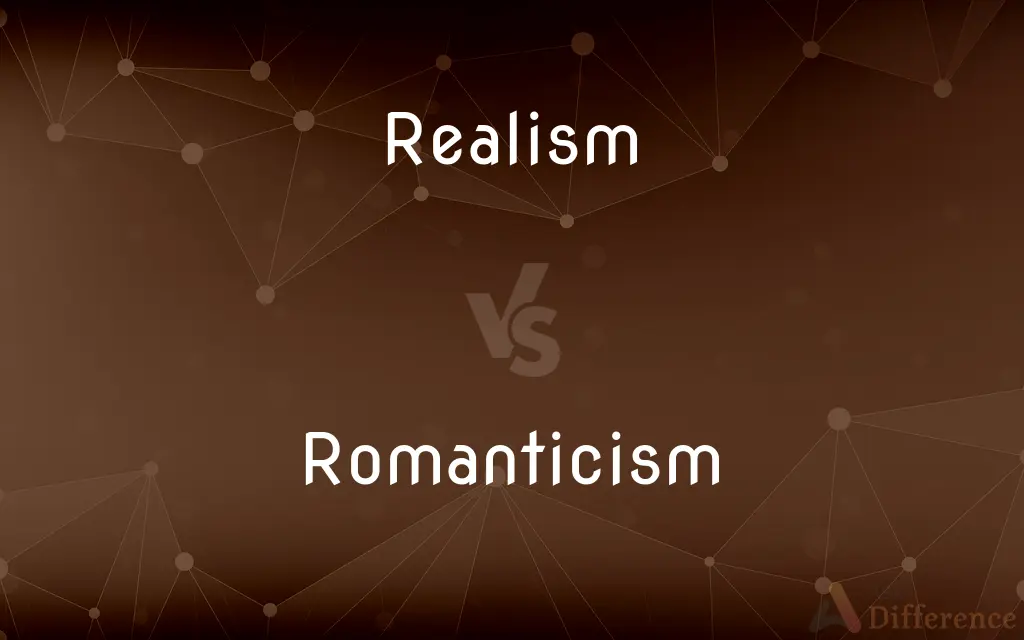Realism vs. Romanticism — What's the Difference?
By Tayyaba Rehman — Updated on September 15, 2023
Realism emphasizes objective reality and life as it is, while Romanticism celebrates emotion, individualism, and nature's beauty.

Difference Between Realism and Romanticism
Table of Contents
ADVERTISEMENT
Key Differences
Realism and Romanticism are two contrasting movements in art, literature, and philosophy. Realism seeks to represent the world and human experience as it truly is, often focusing on everyday life and its hardships. Romanticism, in contrast, emphasizes emotion, imagination, and individual perception, often idealizing its subjects.
In the realm of literature, Realism often presents detailed descriptions of the ordinary, placing importance on character over plot. Characters in realist works are often complex, facing genuine challenges without the guarantee of a happy ending. Romanticism, however, leans towards the dramatic, the mysterious, and the heroic, often with a deep connection to nature, beauty, and human emotion.
From a visual arts perspective, Realism painters might capture the gritty details of urban life or the precise features of a subject. Romanticism, meanwhile, might showcase a sublime landscape or a scene charged with emotional intensity, valuing feeling over factual accuracy.
Philosophically, Realism asserts that there is an objective reality independent of human thought. It believes in the power of rational thought and often dismisses excessive emotion. On the other hand, Romanticism celebrates the individual's intuition and emotional depth, suggesting that emotion can hold truths logic cannot reach.
Comparison Chart
Core Focus
Objective reality
Emotion and individual perception
ADVERTISEMENT
Representation in Arts
Depicts life as it is, often gritty
Idealizes subjects, highlighting emotion and nature's beauty
Literary Approach
Character-driven, everyday scenarios
Emotionally charged, often connected to nature
Philosophical Basis
Objective reality independent of human thought
Emotion and intuition can reveal truths
View on Emotion
Often dismissed in favor of rational thought
Celebrated and seen as a source of deep truth
Compare with Definitions
Realism
A focus on depicting everyday life accurately.
The novel's Realism shone through its authentic portrayal of a working-class family.
Romanticism
An artistic and literary movement celebrating emotion and nature.
Romanticism in his poetry was evident through its passionate descriptions of the natural world.
Realism
An artistic movement emphasizing truth and objectivity.
Realism in painting led to intricate details and true-to-life representations.
Romanticism
A cultural movement valuing emotion over reason.
Through Romanticism, composers expressed deep feelings in their symphonies.
Realism
A literary technique detailing genuine human experiences.
Through Realism, the author shed light on the struggles of urban life.
Romanticism
A style emphasizing intuition, imagination, and individualism.
The novel, filled with drama and emotion, was a hallmark of Romanticism.
Realism
A philosophical stance valuing facts and the tangible.
The debate was settled with Realism, focusing on hard evidence.
Romanticism
Romanticism (also known as the Romantic era) was an artistic, literary, musical, and intellectual movement that originated in Europe towards the end of the 18th century, and in most areas was at its peak in the approximate period from 1800 to 1850. Romanticism was characterized by its emphasis on emotion and individualism as well as glorification of all the past and nature, preferring the medieval rather than the classical.
Realism
An inclination toward literal truth and pragmatism.
Romanticism
Often Romanticism An artistic and intellectual movement originating in Europe in the late 1700s and characterized by a heightened interest in nature, emphasis on the individual's expression of emotion and imagination, departure from the attitudes and forms of classicism, and rebellion against established social rules and conventions.
Realism
The representation in art or literature of objects, actions, or social conditions as they actually are, without idealization or presentation in abstract form.
Romanticism
Romantic quality or spirit in thought, expression, or action.
Realism
The scholastic doctrine, opposed to nominalism, that universals exist independently of their being thought.
Romanticism
A romantic quality, spirit or action.
Realism
The modern philosophical doctrine, opposed to idealism, that objects exist independently of their being perceived.
Romanticism
A fondness for romantic characteristics or peculiarities; specifically, in modern literature, an aiming at romantic effects; - applied to the productions of a school of writers who sought to revive certain medi val forms and methods in opposition to the so-called classical style.
He [Lessing] may be said to have begun the revolt from pseudo-classicism in poetry, and to have been thus unconsciously the founder of romanticism.
Realism
A concern for fact or reality and rejection of the impractical and visionary.
Romanticism
Impractical romantic ideals and attitudes
Realism
An artistic representation of reality as it is.
Romanticism
A movement in literature and art during the late 18th and early 19th centuries that celebrated nature rather than civilization;
Romanticism valued imagination and emotion over rationality
Realism
(sciences) The viewpoint that an external reality exists independent of observation.
Romanticism
An exciting and mysterious quality (as of a heroic time or adventure)
Realism
(philosophy) A doctrine that universals are real—they exist and are distinct from the particulars that instantiate them.
Romanticism
An appreciation for the mysterious and the sublime.
The artwork's Romanticism was evident in its awe-inspiring portrayal of the vast sea.
Realism
As opposed to nominalism, the doctrine that genera and species are real things or entities, existing independently of our conceptions. According to realism the Universal exists ante rem (Plato), or in re (Aristotle).
Romanticism
A philosophical stance seeing emotion as a source of truth.
His argument leaned towards Romanticism, emphasizing personal feelings and experiences.
Realism
Fidelity to nature or to real life; representation without idealization, and making no appeal to the imagination; adherence to the actual fact.
Realism
The practise of assessing facts and the probabilities of the consequences of actions in an objective manner; avoidance of unrealistic or impractical beliefs or efforts. Contrasted to idealism, self-deception, overoptimism, overimaginativeness, or visionariness.
Realism
The attribute of accepting the facts of life and favoring practicality and literal truth
Realism
(philosophy) the philosophical doctrine that physical object continue to exist when not perceived
Realism
The state of being actual or real;
The reality of his situation slowly dawned on him
Realism
An artistic movement in 19th century France; artists and writers strove for detailed realistic and factual description
Realism
(philosophy) the philosophical doctrine that abstract concepts exist independent of their names
Realism
The belief in an external reality independent of human perception.
His approach to science was grounded in Realism, relying on measurable data.
Common Curiosities
What is the primary focus of Realism?
Realism emphasizes the objective representation of everyday life and its truths.
Can a work be both Realistic and Romantic?
While they're contrasting movements, a work can blend elements of both Realism and Romanticism.
How does Romanticism view nature?
Romanticism often idealizes nature, seeing it as a source of inspiration and emotional depth.
What themes are common in Romantic literature?
Romantic literature often explores themes like nature, emotion, beauty, and individualism.
What kind of characters might a Realistic novel feature?
A Realistic novel might feature everyday people facing genuine, often challenging life circumstances.
Which movement values emotion more?
Romanticism places a higher value on emotion, intuition, and individual perception.
When did Realism become prominent?
Realism gained prominence in the mid-19th century, particularly in literature and art.
Are Realism and Romanticism limited to literature?
No, both movements have influenced art, philosophy, music, and other cultural realms.
How does Realism view the world?
Realism seeks to view the world as it truly is, often highlighting its gritty or mundane aspects.
Why did artists turn to Realism?
Many artists turned to Realism as a response to societal changes and a desire to depict genuine life experiences.
How does Romanticism view the individual?
Romanticism celebrates the individual, their emotions, and their unique perceptions.
Can Romanticism be seen in today's works?
Yes, elements of Romanticism, such as a focus on emotion and nature, can be found in contemporary works.
How might a Romantic painting look?
A Romantic painting might portray dramatic landscapes, emotional scenes, or idealized subjects.
Are these movements restricted to Western culture?
While both originated in the West, elements of Realism and Romanticism can be found in various global cultures and works.
Which movement is more idealistic?
Romanticism is more idealistic, often presenting a beautified or elevated view of its subjects.
Share Your Discovery

Previous Comparison
Exemplarily vs. Exemplary
Next Comparison
Layer vs. StratumAuthor Spotlight
Written by
Tayyaba RehmanTayyaba Rehman is a distinguished writer, currently serving as a primary contributor to askdifference.com. As a researcher in semantics and etymology, Tayyaba's passion for the complexity of languages and their distinctions has found a perfect home on the platform. Tayyaba delves into the intricacies of language, distinguishing between commonly confused words and phrases, thereby providing clarity for readers worldwide.














































